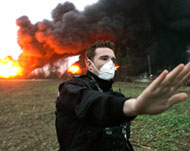UK oil depot fire continues to rage
Firefighters have been battling a blaze at an oil depot north of London with chemical foam, after resolving concerns that attempts to extinguish the fire could contaminate the water supply.

“We are in uncharted territory. This is the largest fire of this kind that the UK and Europe have dealt with,” said Roy Wilsher, chief fire officer in Hertfordshire county.
“We are not even sure how the thermal current will affect the foam that is being applied – it might just vaporise it.”
On Monday, a thick black plume of smoke continued to billow from the Buncefield fuel depot 40km north of London, the fifth-largest fuel depot in Britain.
The fire began with a series of explosions before sunrise on Sunday, shattering windows and blowing doors off nearby homes. Police said the blasts appeared to be accidental.
Most of the 43 people injured were treated for cuts and bruises from the flying glass of broken windows in Hertfordshire.
Two men with more serious injuries remained in local hospitals on Sunday night, and one was released on Monday, Hertfordshire police said.
Conditions worse
Wilsher said that 20 or more tanks at the facility had been destroyed but that firefighters had managed to protect seven others through the night.
|
“The conditions this morning are certainly worse than yesterday because of a change of wind conditions” |
“We are using 32,000 litres of water a minute from two separate attack points,” he said.
“The conditions this morning are certainly worse than yesterday because of a change of wind conditions, so the smoke is swirling around the site which makes the conditions particularly harsh for our firefighters and the oil industry firefighters who are assisting at the site,” he added.
He said firefighters were within a hundred metres of the blazing tanks.
“Conditions will be very harsh. They will be wearing breathing apparatus and protective equipment. They will be monitored by safety officers, and we will be bringing relief in all the time to make sure they are not in those conditions for too long,” Wilsher said.
No pollution danger
Hertfordshire police said earlier that the fire service, the Environment Agency and police were all satisfied that foam could be used without danger of polluting water supplies.
There had been fears that runoff from the site could contaminate surface and ground water with fuel.
 |
|
Noxious fumes from the fire |
The Buncefield terminal, operated by Total UK and part-owned by Texaco, stores 16 million litres of petrol, diesel, kerosene and aviation fuel.
The national Environment Agency said it was concerned that substances including kerosene, diesel, gas oil and petrol could mix with the foam and escape from the site and pollute surface rivers and groundwater.
“We’ve come up with a plan that holds in that water on the site in walled areas, called bunded areas, and we are having those areas monitored constantly,” Wilsher said.
Noxious fumes from the fire, which left some people coughing, affected the large squads of police who sealed off the area and evacuated nearly 300 people to a bowling alley being used as a temporary shelter.
About 25 police officers were examined by doctors for problems such as chest tightness or shortness of breath, said Howard Bortkett-Jones, medical director of the two local hospitals.